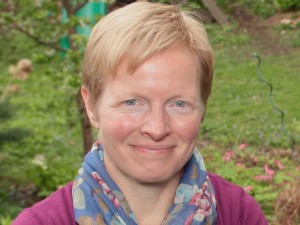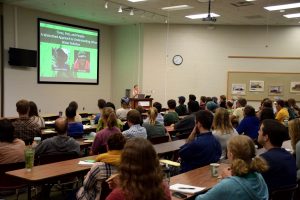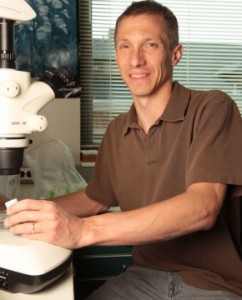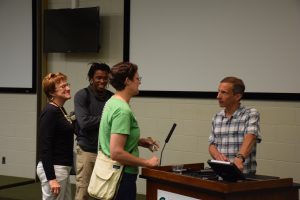The week of June 19, KBS hosted ecologists Dr. Sarah Hobbie and Dr. Jacques Finlay as part of its Eminent Ecologist Seminar Series. The series began in 1983, and has brought more than 80 speakers to KBS.
Dr. Sarah Hobbie led off the week on Monday, speaking on “Trees, Pets, and People: A Watershed Approach to Understanding Urban Eutrophication”. Dr. Hobbie is a University of Minnesota Professor in the Department of Evolution, Ecology and Behavior.
Her research focuses on the ways changes in atmospheric conditions and climate influence ecosystem processes, the ways urbanization and suburbanization affect biogeochemical processes, and the ways plant species influence biogeochemical cycles.
“Trees, Pets, and People: A Watershed Approach to Understanding Urban Eutrophication” addressed the topic of water quality in urban settings, focusing on the roles of Nitrogen and Phosphorus in Eutrophication.
Eutrophication refers to excessive plant growth in water and is a form of pollution. This excessive plant growth can be accelerated by increased levels of Nitrogen and Phosphorus, which act as a fertilizer for this aquatic plant growth that leads to Eutrophication. Eutrophication negatively affects water quality by increasing plant growth and decreasing biodiversity.
Dr. Hobbie’s seminar looked at the sources of the nitrogen and phosphorus that have been leading to eutrophication in urban watersheds in Minnesota, and identified a few factors. Because storm drains are processed separately from and therefore the water is not treated as it is in sanitary drains, storm drains tend to suffer from nonpoint source pollution, which is pollution whose source cannot be pinpointed because it is a result of multiple sources.
Another factor that contributes to this pollution is the imperviousness of concrete – drainage systems are more effective at moving nutrients into storm sewers because the nutrients collect and are swept into drains rather than percolate through the ground and into the groundwater. The most basic root of this problem is that historic bodies of water have been altered and replaced by storm drains.
Dr. Hobbie went on to explain that pet food, tree litterfall, and lawn fertilizer were three of the biggest inputs of nitrogen and phosphorus into urban waters. Pet food becomes an input in that pet owners buy pet food in store, bring it home, feed it to the dog, who excretes those nutrients back into the landscape.
Tree litterfall refers to the nutrients added to the water when the trees drop their leaves in the fall, causing an influx of phosphorus and nitrogen. Another input of nitrogen is lawn fertilizer, which is applied directly to lawns by lawn care companies, and especially after extreme storms is swept into storm drains.
Dr. Hobbie concluded with possible solutions for excess Nitrogen and phosphorus inputs, explaining that we could attempt to decrease lawn fertilization, have more targeted street sweeping for leaves, or have residents take care of their own leaves. These solutions tend to be complicated, as there are many factors that influence fertilizing behavior, and different trees drop their leaves at different times.
On a similar note, Dr. Jacques Finlay, also a University of Minnesota Professor in Ecology, Evolution, and Behavior, spoke on “Climate, Land Use, and Management Influences on Past and Future Water Quality in Minnesota Agricultural Landscapes”.
Finlay addressed issues of water quality in the Minnesota River Basin, specifically the increase of nutrients, phosphorus, and sediments. Finlay talked about Lake Pepin, jokingly calling it “Lake Will-be-gone” as the lake is filling in rapidly with sediments. Lake Pepin is projected to be ⅓ gone in the next hundred years, with the rest of the lake filling in “not too much after.”
One aspect of the increased sediment is the glacial legacy of the area. Approximately 11,700 years ago glacial Lake Agassiz covered 365,000 square miles including portions of northwestern Minnesota. When this glacial lake drained, it carved out a large channel in the Minnesota River Basin. Because of the amount of glacial sediment in the Minnesota River Basin, tributary streams to Minnesota River create deep river valleys with high rates of erosion, because these tributaries are elevated in glacial soil.
This increased channel erosion leads to increased sedimentation and Phosphorus, which leads to eutrophication. Dr. Finlay highlighted many possible solutions, including better drainage management, cover crops, wetland restoration and river and stream bank stabilization.
Our takeaway from both Hobbie and Finlay is that communities are still learning about their relationship with their environments. More research like this is needed to fully understand how our daily routines and urban infrastructure affect the surrounding ecosystems, and as a result, affect our lives.
The next Eminent Ecologist seminar is July 10, with guest speaker, Dr. Judith Bronstein, Distinguished Professor in University of Arizona’s Department of Ecology & Evolutionary Biology. On July 12, Dr. Goggy Davidowitz, Associate Professor in University of Arizona’s Department of Entomology, will be speaking. Both seminars will be held in the KBS Academic Auditorium. All are invited to attend and can enroll online.
Maddy Marquardt and Evan Kutz are undergraduate interns in the Community Relations office at the W.K. Kellogg Biological Station.





A legacy of conservation; a commitment to sustainability.
3700 E. Gull Lake Drive
Hickory Corners, MI 49060
(269) 671-5117
info@kbs.msu.edu